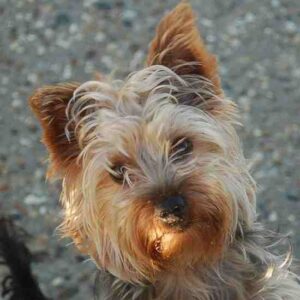As our furry companions age, it’s common to encounter new challenges when it comes to training. This is especially true for senior Yorkies, who may face physical limitations, decreased energy levels, and potential health issues. Despite these challenges, it’s still possible to successfully train your senior Yorkie, with a little patience, creativity, and a willingness to adapt your training methods. Let’s explore some common challenges when training senior dog and how to overcome them.
One of the most important things to consider when training a senior Yorkie is their physical limitations. Older dogs may have reduced mobility or joint pain, which can make certain training exercises difficult or even painful. It’s important to consult with your vet before starting any training program to ensure that your Yorkie is healthy enough to participate. Additionally, you may need to adjust the intensity and duration of your training sessions to accommodate your senior Yorkie’s physical abilities.
Another important factor to consider is your senior Yorkie’s energy levels. As dogs age, they may become less energetic and require more rest. It’s important to keep training sessions short and engaging to avoid boredom and fatigue. Try breaking up training into shorter sessions throughout the day, rather than one long session. This can help keep your senior Yorkie engaged and motivated.
When it comes to training techniques, positive reinforcement is always a good place to start. This involves rewarding your dog for good behaviour, rather than punishing them for bad behaviour. Senior Yorkies may have a harder time with traditional training techniques that rely on physical corrections, such as leash jerks or choke chains. Positive reinforcement training can be an effective way to train your senior Yorkie without causing physical discomfort or pain.
As your senior Yorkie ages, it’s also important to be mindful of their cognitive abilities. Dogs, like humans, may experience cognitive decline as they age. This can affect their ability to learn and retain new information. It’s important to keep training sessions simple and focused, avoiding complex commands or exercises that may be too challenging for your senior Yorkie.
In addition to adapting your training techniques, you may need to make adjustments to your home environment to accommodate your senior Yorkie. This may include installing ramps or stairs to make it easier for your dog to navigate the house, or providing additional support, such as a harness, to help your dog move around. These changes can help keep your senior Yorkie comfortable and safe, and make training sessions more enjoyable for both you and your dog.
As you see, training a senior Yorkie requires patience, creativity, and a willingness to adapt your approach. By considering your senior Yorkie’s physical limitations, energy levels, cognitive abilities, and environment, you can create a training program that is effective and enjoyable for both you and your furry companion. With a little extra care and attention, you can help your senior Yorkie stay happy, healthy, and well-trained throughout their golden years.
